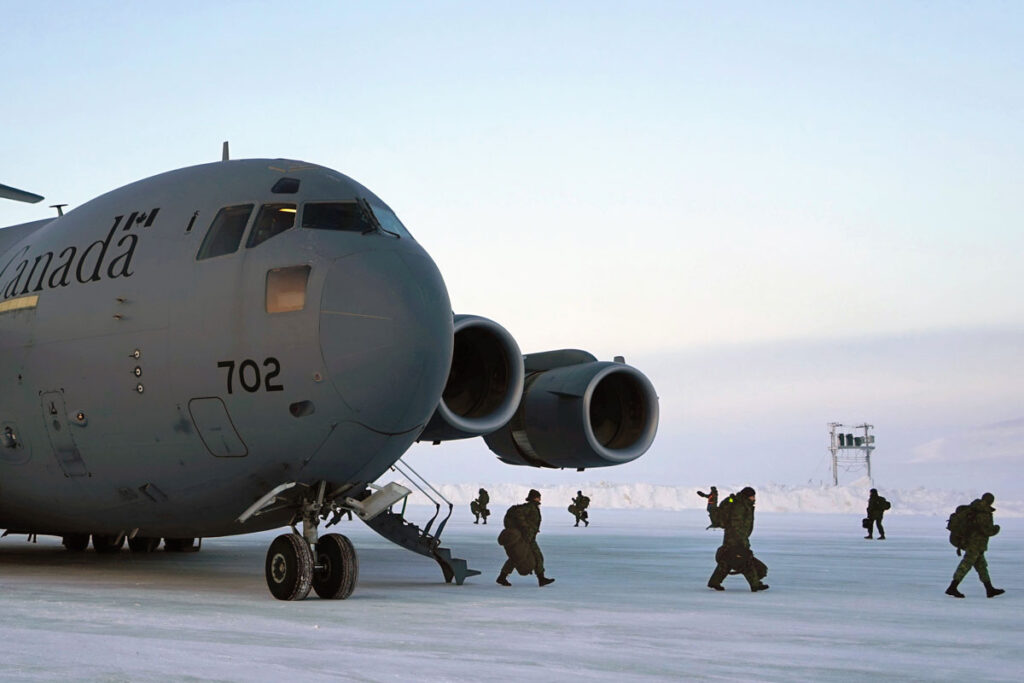Canada’s global reputation on national security is that of a freeloader that does not carry its fair share of defence.
A recent poll by Ipsos is both revealing and reassuring about how Canadians view the security of the Arctic. “Increasingly, Canadians are viewing the Arctic as a key area of interest for monitoring and defending. Over eight in 10 (83 per cent) of Canadians want Canada’s military to monitor all who sail through the Northwest Passage, which passes through Canadian territorial waters,” states an Aug. 4 press release accompanying the poll. “Canadians are also in favour of an increased presence in the North, with 73 percent agreeing that more military bases should be built in the far North to protect Canada’s Arctic territories, and half (51 per cent) in favour of Canada acquiring nuclear submarines to defend the region.” The November 2022 report of the Auditor General of Canada on the surveillance of Arctic waters and the 2023 reports of both the Senate and House of Commons Committees on National Defence deplore the government’s performance on the matter of national security of the Arctic. This, at a time when the geopolitical situation is becoming increasingly complex and dangerous.
The disappearance of the ice is increasing access to the Arctic Archipelago. For a number of years, I have been promoting the development of Resolute Bay as a security hub in the Arctic for all the federal departments to deliver on their national responsibilities. Resolute Bay sits in the centre of the Arctic Archipelago, and on most of the possible transit routes of the Northwest Passage. Resolute Bay would provide a critical base of operations for the Canadian Armed Forces, Canadian Coast Guard, Fisheries and Oceans, Canadian Border Security Agency, the Hydrographic Services, and Natural Resources, to name but a few.
The present facilities provide a solid base on which to develop Resolute Bay as a security hub, while at the same time generating business and employment opportunities for Inuit business and Nunavummiut.
Tourism is increasing with the disappearing ice, offering various business opportunities, such as supporting the growing cruise industry. The planned laying of fiber-optic cables across the Northwest Passage would allow for a satellite downloading farm, similar to one in Sweden, and potentially even a data centre. All of the federal services would benefit from modern infrastructure, including science, search and rescue, and environmental response.
As I suggested at the Canadian Maritime Advisory Council’s Prairie and Northern Region meeting on May 11 in Quebec City, if Canada is serious about improving its Arctic maritime domain awareness, one of the simple and inexpensive ways to do this is to increase the number of ships that are obligated to report to the Northern Canada Vessel Traffic Services Zone Regulations (better known as NORDREG), and to require them to continuously emit on the automatic identification system while in Canadian waters. Since this would only require a change to the regulations, it could be simply and quickly done under the authority of the minister Responsible.
I also recommended in a recent article in Vanguard magazine that the Canadian-developed high frequency surface wave radar system, which was installed and tested in Nova Scotia years ago, be deployed to persistently monitor vessel traffic at the Arctic Archipelago choke points. The data, provided by Maerospace of Waterloo, Ont., would greatly assist the Maritime Security Operation Centre in Halifax to identify ships disregarding regulations, and prevent them from entering our waters.
Lastly, given the cost of nuclear submarines, our politicized and broken procurement system, and the fact that Canada was not even invited to join a British, American, and Australian effort to share nuclear power submarine technology, I recommended the use of underwater drones such as the Explorer class of vehicle from British Columbia-based International Submarine Engineering to remotely monitor under the ice the vulnerable entry point to our arctic internal waters as well as their approach.
The investment in the development of Resolute Bay could be applied to our meagre 1.3 percent of GDP on defence, and improve our standing with our allies. Internationally, Canada’s reputation on national security is that of a free-loader that does not carry its fair share of defence. When it comes to the Arctic, I will let the reports above make the case.
The recommendations I made would address most of the concerns raised by our citizens in the Ipsos poll. To secure the Arctic, we need a champion and leadership. I know where I stand. I will let you be the judge.
I sincerely hope that Minister of National Defence Bill Blair will continue the efforts that former minister Anita Anand is credited with.
Disclosure: Maerospace of Waterloo, Ont. is a client of Arctic Security Consultants.
